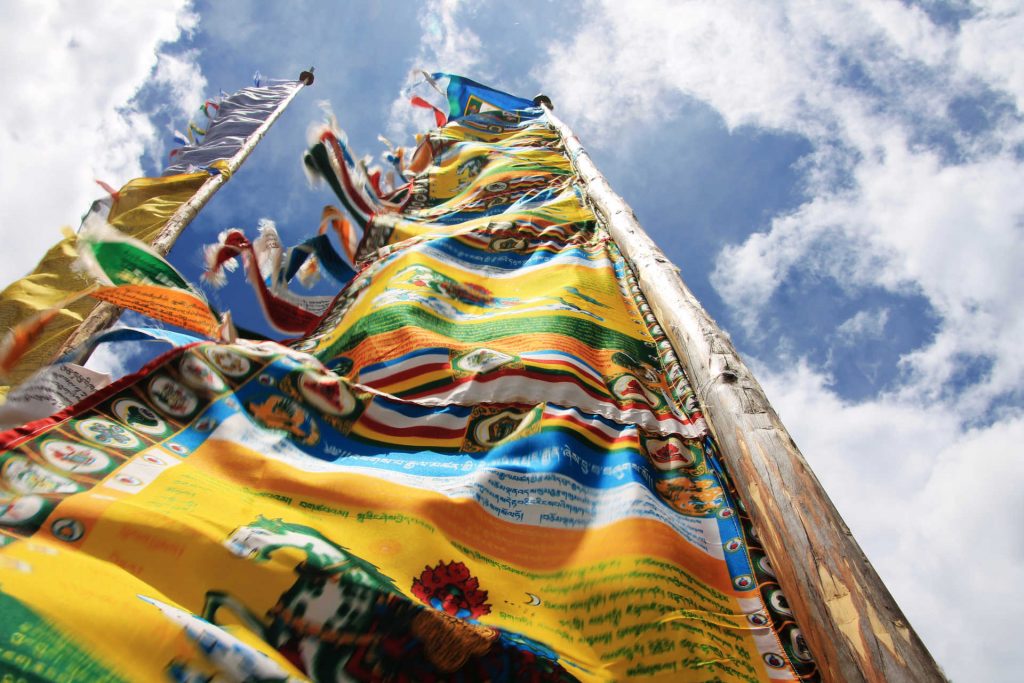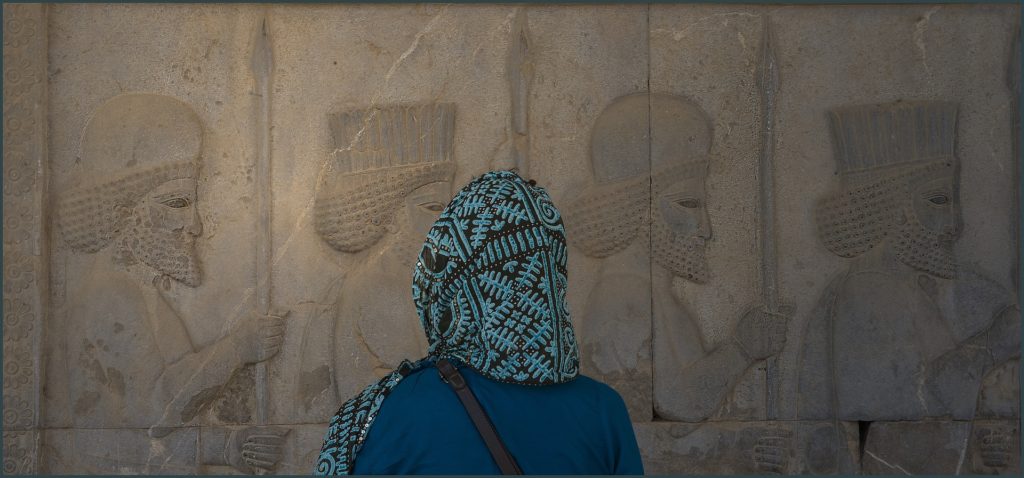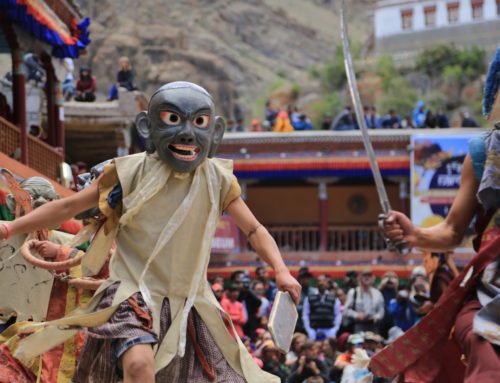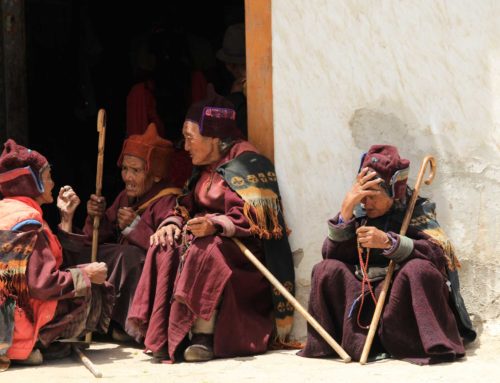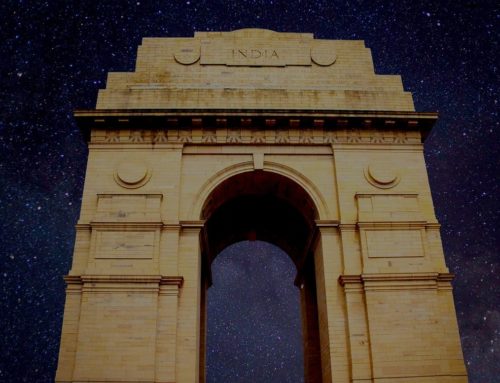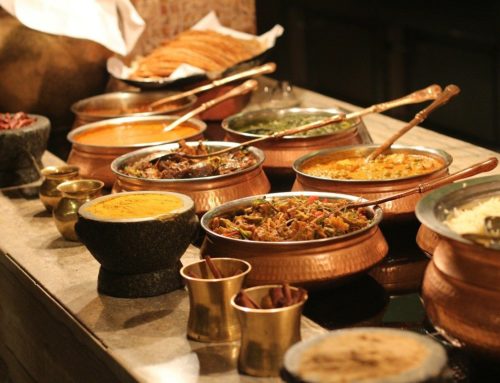When visiting a family home in Bhutan

By Ulrike Čokl
Ulli has lived in Bhutan on and off for many years. She has conducted ethnographic research on traditional hospitality practices, travelling & gift-exchange in rural communities. Thus she is very familiar with village livelihoods all over the little kingdom. She loves developing unique itineraries that offer a glimpse into the rich cultural traditions and practices of Bhutanese society.
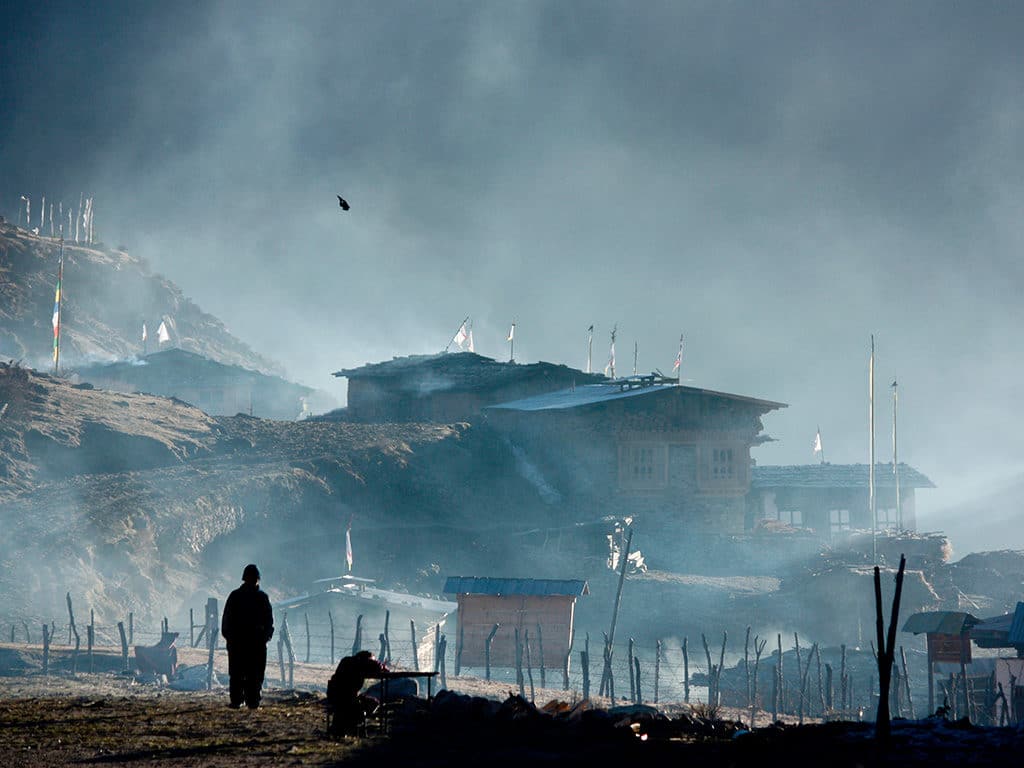
Photo: Marina Beck Photography
The load of merit that is accumulated through pleasing a single guest cannot be carried by a horse.
(Bhutanese saying)
“Come in, come in!” This is how I am usually ushered into a village home in Bhutan. Depending on where I am regionally, ara (local moonshine) or tea will be served together with snacks. Usually a meal will be prepared or at least offered. The reception, donglen, and the way guests are managed, goemgi shongzhag, depends on the type of guest one hosts. From official visits and high level guests to a neighborly stop by, a good host must always be generous and compassionate. However, there are variations in regard to etiquette depending on the degree of familiarity and status of the guest. Lamas and high level officials for instance, will often be met on the way and given offerings of ara and snacks sometimes accompanied by the sound of trumpets. They will be directly escorted to the choesham (altar room) and seated on a soft mattress. However, here I want to talk about how you, a tourist from a foreign country, will be received and treated, so as to help you understand some basics about Bhutanese hospitality.
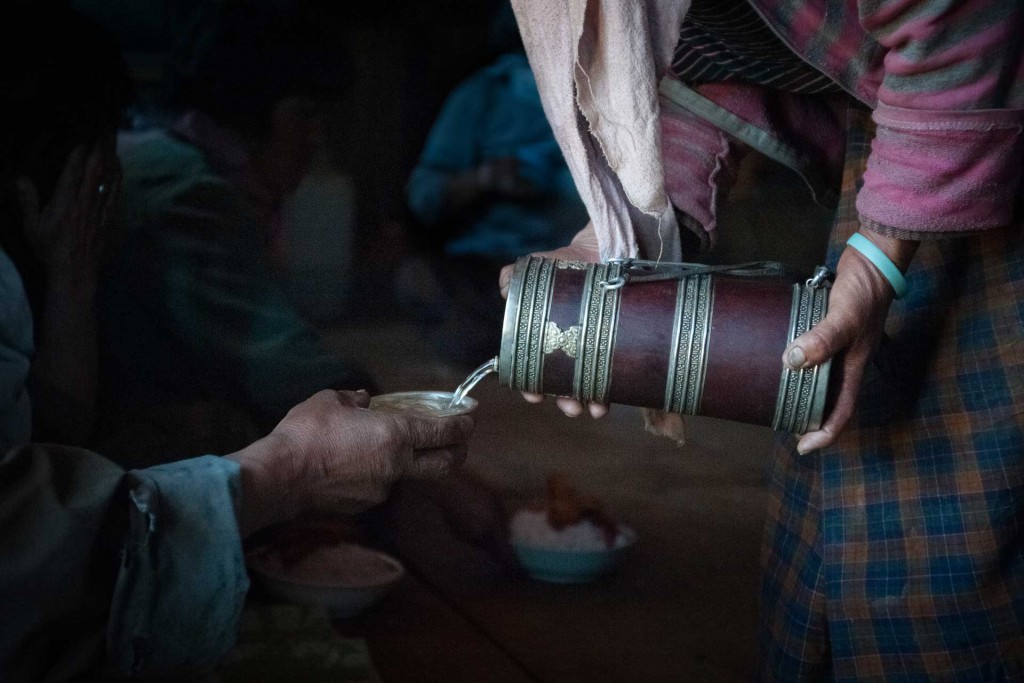
Ara – the welcome drink. Photo: Wulff Hoerbe
Taking a meal at a Bhutanese home
When you arrive at a village house, your guide will approach the door and call the nangi aum’s (housewife’s) name, or, in case he or she has called the family in advance, they will come and greet you outside. We usually arrange for you to be seated in the kitchen area as you will be able to observe the family going about their chores. Additionally it is the warmest room in the house due to the mud or metal ovens where, in many places, the fire is kept going throughout the year. There are no chairs or tables in traditional homes and you will be seated on the floor on flat cushions or carpets. Some wealthier families do have separate rooms with sofas and low tables to accommodate guests. Nevertheless it is nicer for tourists to sit in the kitchen where the family is always engaged in some activities such as butter churning, food preparation or other tasks. We encourage our guides to properly introduce the family by name but this doesn’t seem to be a tradition in Bhutan. Don’t hesitate to remind your guides in case they forget. While taking a seat do not worry if you cannot sit cross-legged. Again, just ask you guide or, if the family speaks English, ask them which direction to stretch your legs without offending anyone. Usually the soles are not shown towards the alter room or towards other people. However, Bhutanese are flexible and understand that sitting on the floor in such a position is tough for most foreign guests and they will be happy to make you feel comfortable. Ultimately, treating guests with compassion is more important than being fundamentalist about traditional etiquette. In general you should always feel free to ask your guide about anything that you might feel doubtful or insecure about.
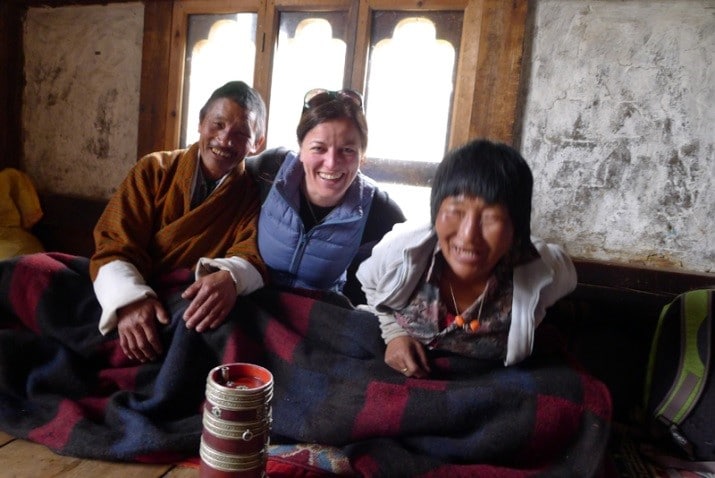
Prior to your arrival, our guide will have organized a gift, chom, to offer to your hosts upon arrival. It usually is something that is needed and depends on the time of the year and location of the home. From oil, sugar, salt, biscuits, vegetables, candles and meat to incense and oil for butter lamps, it can be a variety of items. Of course you can bring your own gift from your home country which will be highly appreciated. Gifts must not be handed over the threshold of the house as this is considered bad luck and will turn you into enemies. Wait until you are seated and ara or tea has been served before handing over your present. Most likely the family will take it and put it aside, not showing much interest in front of you as this would be considered immodest. One should not show too much excitement about gifts or else it might seem greedy. Of course in contemporary Bhutan such rules are not written in stone, as they may have been in the past. So, in case you experience such behavior it has nothing to do with your hosts not being happy about your souvenir. On the contrary, once you have left, they will look at it with curiosity.
When food is being served you will encounter your next surprise. The variety and amount of dishes are amazing but moreover the family will not join in and share lunch or dinner with you. This has nothing to do with your hosts feeling inferior as is often assumed by guests. It is strictly in accordance with local traditional etiquette and ideas of politeness. No need to feel bad or weird. You can make it a point that the family join in during your next meal in the same house, in case you stay overnight. Bhutanese eat with their hands, and you, too, can have a try with your fingers if you want but you can also use a spoon or a fork which is available in most households.
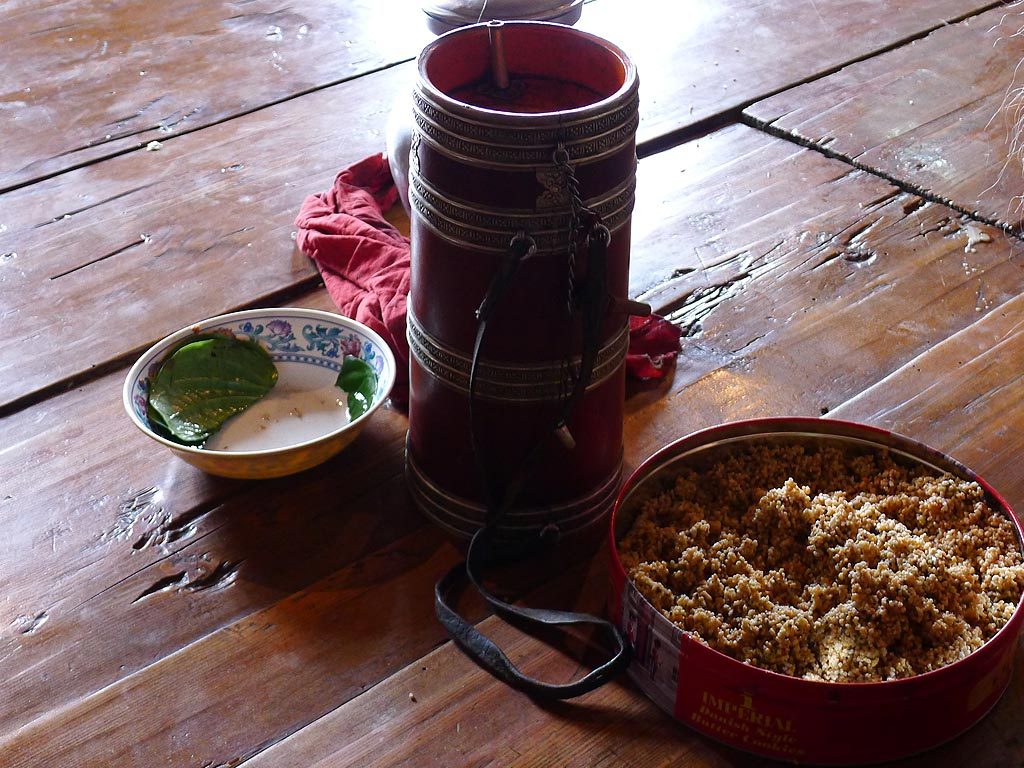
It is a very important aspect of Bhutanese hospitality that the host encourages, even forces, guests to eat more. However, most homestay hosts have noticed that many tourists cannot eat as much as the average Bhutanese, especially rice and chilies. Nevertheless they might still insist on re-filling your plate and cup. True, the more you eat the happier the hosts are but they also will understand if you eat less. I personally would recommend taking less the first time and going for a re-fill as that makes them happy. Similarly with drinks one or two re-fills are a must. The trick is not to empty your cup completely before your host offers the re-fill. Just take a little sip instead and don’t do bottoms up.
After you have completed your meal some guests feel the urge to jump up and help clean the dishes, but don’t do it! It might make the family feel awkward as you are the guest and not supposed to help with such tasks when newly arrived. This will be different for the guide and driver as they are not new to the householders and are familiar to them. As mentioned above things might be different after you have stayed a night or two and etiquette will loosen up a bit. But during your first meal, just go with the flow.
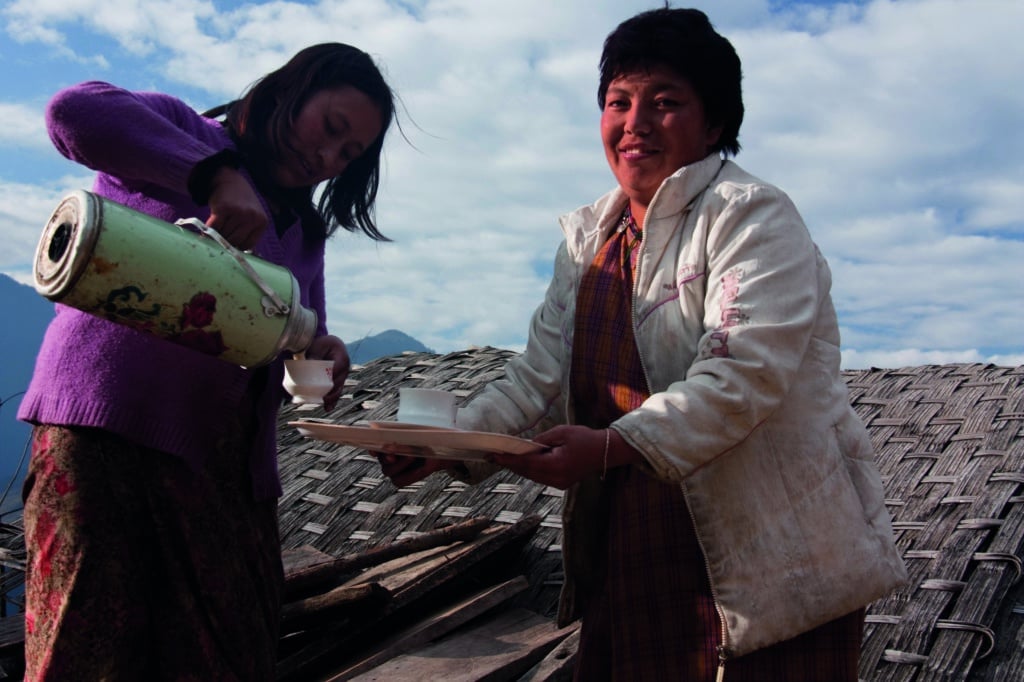
Whilst in many European societies, people relax after food and continue with drinks and chatting, this was never really a tradition in Bhutan. There you would chat and drink before dinner or lunch is being served and bid your farewell rather quickly after the meal is completed. However, this is also slowly changing.
The traditional farewell gift, soera, is usually a tip to the householders for the received hospitality. In your case the guide will handle this but if you wish you can tip the family directly while squeezing a bill or two into the nangi aum’s hand during good byes. She might refuse but you have to insist, that is the game. In return they might present you with some local produce such as cheese, butter or fruits.

